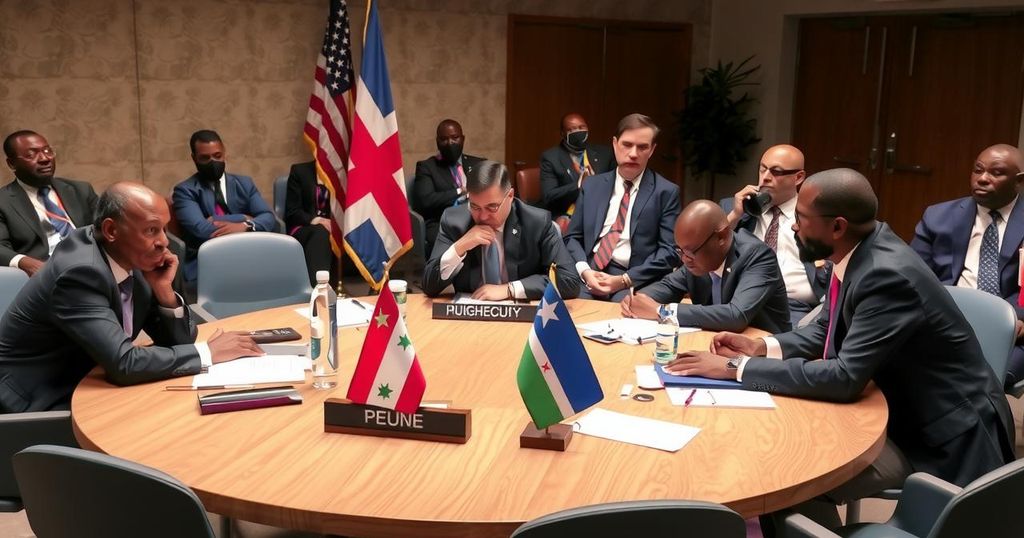The UN Security Council addressed the escalating violence in Eastern DRC, highlighting armed groups’ impact on stability and humanitarian conditions. UN Special Representative Bintou Keita reported on governance reforms and regional mediation efforts through the Luanda process, emphasizing the importance of local input for sustainable peace. The session underscored the necessity of addressing resource exploitation and the humanitarian crisis while amplifying the voices of affected communities, particularly women.
The United Nations Security Council convened to discuss the persistent violence affecting Eastern Democratic Republic of the Congo (DRC) and the urgency to restore peace. Bintou Keita, the UN Special Representative for the DRC and head of the United Nations Stabilization Mission in the DRC (MONUSCO), presented reports on increasing insecurity, notably due to the activities of armed groups like the Allied Democratic Forces (ADF), March 23 Movement (M23), Cooperative for the Development of the Congolese People (CODECO), and the Zaïre militia. Keita underscored the importance of local, national, and regional processes to ensure sustainable peace while commending the Luanda process for mediation efforts led by Angola, preparing for a significant summit on December 15 that will involve leaders from Angola, the DRC, and Rwanda to solidify progress toward stability.
In light of recent governance reforms aimed at improving public services, security measures, and the management of natural resources, Keita encouraged all stakeholders to collaborate to avoid exacerbating tensions surrounding potential constitutional revisions. She observed critical developments regarding the ceasefire agreed upon between the DRC and Rwanda and the recent establishment of the Reinforced Ad-hoc Verification Mechanism (R-AVM) tasked with monitoring the truce.
Keita also detailed the volatile conditions in Eastern DRC, where the M23 has consolidated control over territories and the ADF continues to perpetrate grave violence against civilians. Moreover, she highlighted the ongoing struggle over valuable resources, particularly in North Kivu, where conflict remains intricately linked to resource exploitation, urging a coordinated regional effort against such illicit activities.
Additionally, the humanitarian crisis is exacerbated by climate-related challenges, with millions displaced and various epidemics complicating the situation. The funding for the Humanitarian Response Plan has seen improvements from the previous year, aligning with ongoing efforts to address gender-based violence, which remains alarmingly high, particularly in North Kivu. Keita recognized the DRC Government’s ongoing initiatives to combat impunity in cases of sexual exploitation and violence.
In closing, Keita emphasized the importance of amplifying the voices of women and marginalized groups, citing their united call for sustained efforts to achieve lasting peace in Eastern DRC, allowing communities to return to their homes and rebuild their lives.
The Democratic Republic of the Congo has been plagued by protracted violence and armed conflict, particularly in its eastern regions, which are rich in natural resources. Various armed groups operate in these areas, leading to significant instability and humanitarian crises. The situation has drawn international attention, prompting the United Nations and various nations to engage in mediatory processes to seek a peaceful resolution. The involvement of regional powers, like Angola and Rwanda, indicates a broader geopolitical interest in ensuring stability in the DRC, especially given the complex interactions between political reforms and ongoing conflicts in the region.
The UN Security Council’s discussions regarding the ongoing violence in Eastern DRC highlight the urgent need for cohesive international and regional efforts to restore peace and stability. Bintou Keita’s comprehensive report illustrates the multifaceted challenges faced by the DRC, which are intertwined with governance issues, resource exploitation, and humanitarian crises. The commitment of both the DRC government to governance reforms and the regional cooperation through the Luanda process is vital. As emphasized, the voices of women and vulnerable populations must be integrated into peace-building efforts for lasting resolutions.
Original Source: news.un.org






